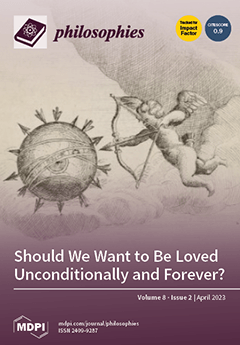Claims (or the implicit assumption) of the inherent worth of life are pervasive and remain virtually unchallenged. I have already argued that these outright moral dictates are thinly veiled vestiges of theological ethics which, following the removal of their theological foundations, remain little
[...] Read more.
Claims (or the implicit assumption) of the inherent worth of life are pervasive and remain virtually unchallenged. I have already argued that these outright moral dictates are thinly veiled vestiges of theological ethics which, following the removal of their theological foundations, remain little more than nebulous claims supported only by fear of the consequences of a challenge. In my previous work, I rejected an
a priori claim of an objective life’s worth, which is the worth that we should assign to
others’ lives, and elucidated a principled framework that gives rise to the said worth immediately, as a consequence of the experiences of its sentient environment. Herein, I address the complementary question of the value of one’s own life, which is the
subjective value of life and, thus, Camus’s (in)famous view that “there is but one truly serious philosophical problem, and that is suicide”. As before, I rejected the inherency of a life’s worth, showing it to be contradictio in adjecto, and instead show how this worth too can in large part be seen to emerge from sentient experiences of the subject. Many of these are innately linked to experiences of other sentient beings as objects, thus erecting a framework that is both principled and thoroughly humane with Schopenhauer’s ‘loving kindness’ running through it. Practically, my framework illuminates an understanding of suicide as a real-world phenomenon, helping those who remain living to understand a deceased one’s decision, and paving the way to answering questions, such as when there should be an attempt to prevent suicide, and what means of suicide prevention are ethically permissible.
Full article





